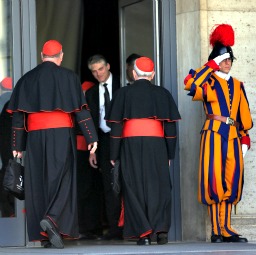Some Cardinals Hope for Quick Conclave
NEWS ANALYSIS: Electors arrive in Rome to elect a successor to Benedict XVI.

VATICAN CITY — While the cardinals appointed by Benedict XVI arrive in Rome and get acquainted with the pre-conclave operations, cardinals from the "old establishment" are pushing for a quick conclave.
An anonymous cardinal — which is how this type of pressure is usually applied — told the Italian press agency AGI that his “dream is that the Church will have a new pope within this week” and that “this is possible if the congregation set this Thursday, the 7th, as the date for the conclave, and the conclave elects the new pope by Friday, the 8th.”
This is almost impossible, since the Sistine Chapel must still be prepared for the conclave and has not been closed to visitors yet.
In 2005, the Vatican office that deals with furnishing and decorating the Sacred Palace — called the Floreria Apostolica — began preparing the Sistine Chapel on April 5, and the conclave did not begin until April 18.
And even though the Floreria clerks are not busy with the novendiali — the nine days of mourning for the late pope — the Sistine Chapel will not probably be ready for at least seven days.
These kind of anonymous declarations appear to be part of maneuvering to hurry the conclave.
Cardinals from the old establishment are among the most active in this pre-conclave period.
On Sunday, Cardinal Leonardo Sandri, prefect of the Congregation for the Eastern Churches, met with Cardinal Angelo Sodano, the dean of the College of Cardinals.
As the former Vatican secretary of state, Cardinal Sodano led the movement during the 2005 conclave to prevent Cardinal Ratzinger’s election. Cardinal Sodano will not be part of this the conclave — he turned 80 six years ago — but he will manage the general congregation meetings of cardinals that began this morning.
In the Sistine Chapel, Cardinal Sodano’s point man will be Cardinal Leonardo Sandri, whose career developed under Cardinal Sodano’s wings ever since he was appointed papal nuncio to Mexico.
In informal meetings ahead of the conclave, Cardinal Sandri has been one of the most active, working to organize the old-establishment cardinals, especially those who are part of the circle of diplomats.
This small group was not overjoyed by Benedict XVI’s election, and they lost influence under his pontificate. After “Ratzinger’s parenthesis,” they would like a pope who is more won-over to their issues and their influence.
Under Benedict XVI, the old guard lost its control over the Secretariat of State, a blow they haven’t forgotten.
The fact that the pope emeritus chose Cardinal Tarcisio Bertone as his secretary of state, when he did not have a diplomatic career, irked them, and so many of the attacks against him originated from their quarter.
When it comes to the conclave, the diplomats are looking for some sort of vindication, pushing for a quick conclave to take advantage of the inexperience of the most recently created cardinals. They are backing the option of electing a second Pope John XXIII, i.e., a very old pope who is able to innovate.
For the time, this has meant a resurrection of Cardinal Jorge Mario Bergoglio, the archbishop of Buenos Aires and Cardinal Ratzinger’s main contender for the papacy in 2005.
Meanwhile, the U.S. cardinals are advocating a later conclave date.
Last week, Cardinal Timothy Dolan of New York remarked, “Don’t hurry the conclave.”
When the conclave will take place is still up in the air.
At a March 4 press conference, Vatican press spokesman Father Federico Lombardi told journalists that there are still 12 cardinals who have not yet arrived in Rome; they will all arrive by tomorrow.











